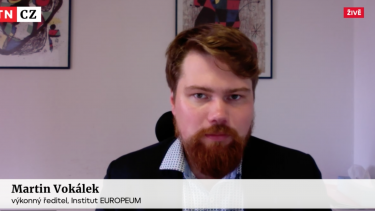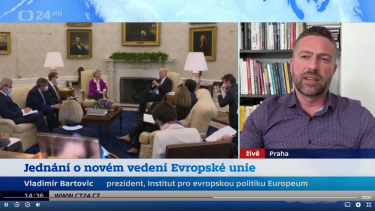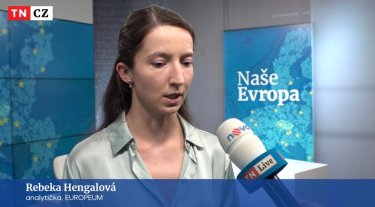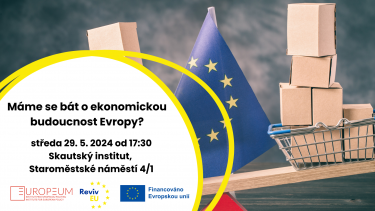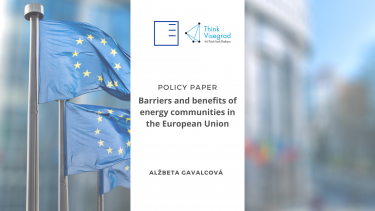TN Live | EU has approved further sanctions. They target the Russian industry and energy sector
European Union has approved its fourteenth package of sanctions against Russia, specifically targeting 116 additional individuals. Whom will the new package of sanctions affect the most? How effective have previous packages been so far? Martin Vokálek, Executive Director of EUROPEUM Institute, answered these questions live for TN Live.
Zjistit více
ČT24 | Negotiations on the new leadership of the European Union
Negotiations on the EU leadership positions will continue next week. On Thursday, leaders and presidents are due to make their final decision at a summit in Brussels. Vladimír Bartovic, President of EUROPEUM Institute, commented on whether Ursula von der Leyen will defend her post as President of the European Commission.
Zjistit víceTV Nova | Development of renewable energy sources
How does the Czech public view climate change and the development of renewable energy sources? Do they see it as a path to competitiveness? According to Czechs, should the European Union focus on environmental issues? Rebeka Hengalová, a research fellow at EUROPEUM Institute, discussed the STEM survey results in collaboration with the EUROPEUM Institute on the program "Naše Evropa" on TV Nova.
Zjistit víceRevivEU | Should we fear for the economic future of Europe?
We invite you to a public podcast recording focusing on the discussion of the impacts of the COVID-19 pandemic on European industrial policy and its potential consequences for the Czech economy and society. We will discuss the new technological dynamics resulting from the pandemic and explore ways in which the European Union can respond to technological competition with the USA and China.
Zjistit vícePolicy Paper | Barriers and benefits of energy communities in the European Union
Energy communities are an effective means to decentralize and renew our energy systems with sustainable solutions as they are usually based on renewable energy. They have already started emerging in 1970´s, yet there has been a significant increase in their development only in recent years, also in terms of their introduction into the EU legislation. Especially in Western and Northern European countries the concept already enjoys vast popularity. On the other hand, in Central and Eastern European countries (further referred to as CEE) energy communities are only beginning to emerge. The policy brief (based on literature and interviews with various stakeholders ) examines the benefits energy communities may bring, and more importantly, the main obstacles remaining in their way for greater evolution in the CEE region – and especially Visegrad countries (V4). As these initiatives progress, sharing the best practices will ensure the success of the community energy in the energy transition. Writes Alžbeta Gavalcová.
Zjistit vícePolicy Paper | Barriers and benefits of energy communities in the European Union
Energetické komunity jsou účinným prostředkem decentralizace a obnovy našich energetických systémů pomocí udržitelných řešení, protože jsou obvykle založeny na obnovitelné energii. Začaly se objevovat již v 70. letech 20. století, avšak k jejich výraznému rozvoji došlo až v posledních letech, a to i z hlediska jejich zavedení do legislativy EU. Zejména v zemích západní a severní Evropy se tato koncepce již těší velké oblibě. Naproti tomu v zemích střední a východní Evropy (dále jen SVE) se energetická společenství teprve začínají vytvářet. Tento politický brief (založený na literatuře a rozhovorech s různými zúčastněnými stranami ) zkoumá výhody, které mohou energetická společenství přinést, a především hlavní překážky, které jim stále stojí v cestě k většímu rozvoji v regionu střední a východní Evropy - a zejména v zemích Visegrádské skupiny (V4). Jak tyto iniciativy postupují, sdílení osvědčených postupů zajistí úspěch komunitní energetiky v energetickém přechodu. Píše Alžbeta Gavalcová.
Zjistit víceRTVS | Extraordinary Summit in Brussels
The extraordinary summit in Brussels is focusing on competitiveness and the EU's strategic agenda, including the strengthening of the single market, Turkey-EU relations, Ukraine and Israel. Žiga Faktor, head of the Brussels office and deputy director of EUROPEUM Institute, commented on this for Slovak RTVS.
Zjistit více
TN.cz | Macron's visit to Prague: Nuclear energy and European security on the agenda
French President Emmanuel Macron visited Prague on Tuesday, met with Czech President Petr Pavel and Prime Minister Petr Fiala, and briefly visited the Czech-French Nuclear Forum. Martin Vokálek, Executive Director of the EUROPEUM Institute, discussed the programme of the state visit and its impact on the Czech Republic in an interview for TN.cz.
Zjistit více
INVITATION | Europe in the grip of crises - What next?
We cordially invite you to a debate with Andrej Stančík on the topic "Europe in the grip of crises - What next?", which will take place on Monday 13th February at 18:00. The debate will take place in the premises of PKC (Prague Creative Centre)
Zjistit víceStaroměstské náměstí 4/1
Praha 1 - Staré Město
110 00
tel.: +420 212 246 552
email: europeum@europeum.org
https://www.europeum.org
